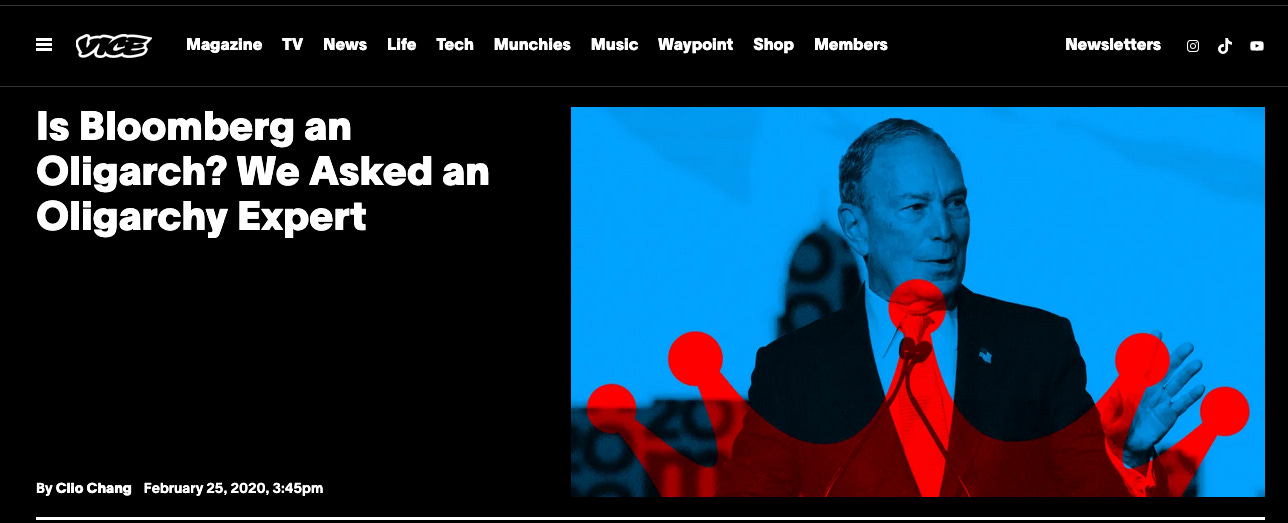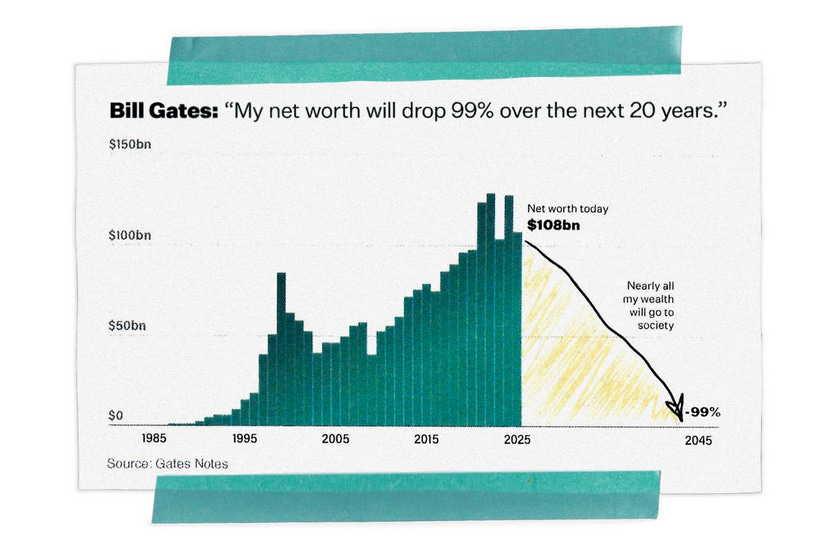It's time to confront oligarch media
As Bloomberg's Billionaire Index mysteriously erases $150 billion from its oligarch ledger, we are once again confronted with the perils of billionaire influence over journalism.

For anyone writing or thinking about oligarchy, a go-to source of information are the wealth estimates put out by Bloomberg and Forbes. These outlets tell us who the richest people on Earth are—in real time—and how much they are worth.
These estimates have long been a source of wonder or curiousity, allowing us to indulge our deep-seated fascination with wealth. Can you imagine having $100 billion? Or $400 billion?
More recently these estimates have served as an important measure of oligarch power, and source of outrage (even if that’s not the intent of Forbes and Bloomberg). The rankings have allowed activists and researchers to show how the billionaire class cashed in on the pandemic, realizing massive wealth gains, as millions of people around the world struggled financially. The estimates have also allowed us to see how billionaires who publicly proclaim their committment to philanthropy have continued to greedily hoard wealth. Big picture, the billionaire rankings demonstrate, in stark numbers, how inequality is expanding as the rich get richer.
Over the several years that I’ve reported on billionaires, numerous sources have told me that they believe the super-rich probably control more money than Forbes and Bloomberg estimate. There’s certainly good reason to believe this. We know that the super-rich can hide and offshore their wealth. And we know they are highly incentivized to do so—either to avoid taxes or scrutiny.
We also know that extremely wealthy people use their money to buy power—including influence over the media. Forbes and Bloomberg illustrate this well; the two media outlets bear the names of two of the richest people in the world, Steve Forbes and Michael Bloomberg. Billionaire influence over the news media, to be sure, weakens the independence of journalists to aggressively follow the money or challenge oligarchy.

In the highly imperfect world in which we live, Forbes and Bloomberg are the best—and, as far as I know, only— sources of oligarch wealth estimates. For what it’s worth, the two outlets often (but not always) seem to offer fairly similar estimates. This gives some sense of consistency and, perhaps, reliability. As I write this, for example, Forbes and Bloomberg both estimate Elon Musk to be the richest man in the world, and their valuations—$405 and $361 billion, respectively—are within around 10 percent of each other. Seems reasonable.
But one could also argue that the difference—$44 billion—is unreasonable. Musk reportedly helped get President Donald Trump (and other politicians) elected in 2024 with well under $1 billion in political donations.
Shouldn’t we be able to know how rich our oligarchs are? How can we confront their money-in-politics predations, or confiscate their democracy-destroying fortunes, or abolish billionaires—if we can lose track of $44 billion? Can we really count on oligarch-owned media to help us follow the money?
A few weeks ago, I did a deep dive into the hundreds of billions of dollars in tax breaks that oligarchs are positioned to take through philanthropy. My analysis required me to know the estimated fortunes of the world’s wealthiest people. Like other researchers, reporters and scholars working on extreme wealth, I had to decide whether to use Forbes or Bloomberg’s estimates.
I went with Forbes. This was in part because Bloomberg—almost unbelievably—does not include its billionaire owner in its index. This editorial decision effectively erases from Earth more than $100 billion. (That’s Forbes estimate of Michael Bloomberg’s wealth, which puts him among the twenty richest people in the world.)
To put it mildly, anyone trying to understand billionaire power is being given extremely misleading—I’d say dishonest—information from Bloomberg.1 And this isn’t the first time that outlet has been accused of embarassingly unjournalistic behavior toward its oligarch owner, who has used his obscene wealth to bankroll a high-profile political career—as mayor of New York City and then as a presidential candidate.
It’s always awkward for media outlets controlled by billionaires—and there are a lot of them—to report on oligarchy. Many outlets like to pretend that they can do so without fear or favor, which, of course, has never been particularly honest or credible. Bloomberg engages in its own brand of magical thinking, pretending that its owner doesn’t even exist.
In July, Bloomberg delivered yet another gift to the billionaire class, erasing an additional $50 billion from its oligarch ledger—and doing so in a way that gave Microsoft billionaire Bill Gates a major PR boost. Bloomberg’s revision to its estimates was delivered without a coherent, public-facing explanation, once again raising questions about whether the outlet is engaged in rigorous, independent financial journalism—or Wizard-of-Oz black-box accounting in service to the super-rich.
On May 8, 2025, Bill Gates did something that billionaires almost never do. He publicly declared his net worth—$108 billion.
This declaration wasn’t an example of a billionaire embracing transparency. This was Gates trying to generate PR by wow-ing the world with how much money he planned to give away.

The effort worked, as news outlets around the world widely reported Gates’s announcement. Bloomberg even invited Gates onto its podcast, giving the billionaire a wholly uncritical platform to boast about his generosity and good deeds, and unpack his political opinions. Unmentioned on the podcast was that Gates’s recently declared wealth, $108 billion, lined up almost perfectly with estimates from Bloomberg’s competitor, Forbes. Bloomberg at the time put Gates’s wealth 50 percent higher, at around $170 billion.
Gates’s wealth has long been one of the largest discrepencies between Forbes and Bloomberg’s wealth estimates. Through one lens, Gates’s declaration could be seen as settling the matter, proving that Forbes has better and more trustworthy financial journalists on staff.
But that’s the wrong takeaway. Just because Gates says he’s worth $108 billion does not make it true. He offered no new financial information to support his claim. And, to state the obvious, there is no reason to believe anything a billionaire says about their finances—unless it can be independently confirmed.
We should be especially skeptical of Gates’s declaration because it matched so neatly to the lowest, public-facing estimate of his wealth. By publicly endorsing Forbes’s estimate, Gates makes himself appear less wealthy than previously considered—which is vitally important to his brand as a philanthropist.
For decades, Gates has endlessly boasted of his generosity, even as, paradoxically, his personal wealth has skyrocketed. (Look again at the bar chart Gates published, above.) As criticism of billionaires and oligarchs expands, Gates’s PR team is desperate to make the world see him as our ‘good billionaire’—a man voluntarily giving up his wealth and willfully dropping off the ranks of the world’s richest people.
Again, the other possible explanation, is that Forbes has brilliant valuation experts and follow-the-money financial reporters who were able to accurately track and trace the entirety of Gates’s fortune. That seems far-feteched. Given how zealously Gates shields his wealth from scrutiny—in 2014, the Wall Street Journal described his money manager’s efforts to mask investments “in nondescript names to make it harder to trace the deals back to Mr. Gates”—it is extremely unlikely that any news outlet could fully follow the money and create a pinpoint-accurate wealth estimate.
For years, the public faced two wildly different wealth estimates for the world’s most iconic billionaire—with no clear explanation for why this was. Late last year, I had reached out to Bloomberg, asking about its estimate. I had also reached out to Forbes—as far back as 2021. I have no record of a response from either outlet.
After Gates declared his wealth at $108 billion in May, I reached back out to Bloomberg. The outlet’s estimate, showing the Microsoft founder to have closer to $200 billion, essentially, presented Gates as dishonest. At the very least, Bloomberg needed to explain and address the massive difference in valuations. The obvious thing for the outlet to do would be to write an article explaining why it believes Gates is worth far more than he claims. Bloomberg didn’t do that.
I first followed up in May with someone I knew at the outlet who told me that, behind its paywall, Bloomberg actually assigns a confidence rating to its estimates. For Gates, the outlet reported medium confidence and acknowledged caveats around its estimate. Two months later, however, Bloomberg abandoned its estimate—and did so in a highly suspicious manner.
On July 3—-the day before a national holiday in the United States when much of the media is offline, and when politicians and companies like to bury embarrassing news or controversial announcements—Bloomberg downgraded its estimate of Gates’s net worth by $50 billion, bringing it in line with Forbes. With the swipe of a pen, Bloomberg had erased tens of billions of dollars from the Earth without any obvious, public-facing rationale.
If there is nothing to hide, why not walk in the light of day? Why not issue a press release explaining the massive correction? Why not issue a mea culpa? Why not use the Gates example to humbly illustrate to readers how uncertain oligarch wealth estimates are?
In the weeks ahead, a number of journalists—perhaps at the urging of Gates’s PR team—took notice of Bloomberg’s change. Many of them reported that the new estimates reflect Gates’s generosity. This is a completely disingenuous narrative—I’d say false. And it’s a totally predictable outcome of Bloomberg’s questionable reporting.
After Bloomberg’s correction, I formally contacted the outlet by email. The outlet did not respond to any of my specific questions, and instead sent me screenshots of several Bloomberg web pages that live behind paywalls—only available to paying subscribers—one of which includes a cursory note about its changed estimate “better reflect[ing] Gates’ outside charitable giving and the wealth estimate provided in a May 8, 2025 Gates Notes blog post.”
This brief statement, buried behind a paywall, only raises more questions.
Financial information about Gates’s charitable giving has long been in the public domain. Bill Gates and the Gates Foundation constantly publicize his donations. And records of his donations can also be found in the Gates Foundation’s annual public-facing tax forms. Read Gates’s May 8 blog for yourself—here—and you’ll see that it contains zero new financial information about his charitable giving that would affect Bloomberg’s current estimates of his wealth.
If Bloomberg is only now including Gates’s decades of well documented charitable giving in its estimates, this demonstrates an alarming—if not disqualifying—level of incompetence. How can we possibly trust the outlet to accurately track billionaire wealth if it is not capable of doing the most basic financial research related to the world’s most visible billionaire? How could Bloomberg misapprehend, and misplace, $50 billion in charitable giving?
And/or—why would Bloomberg try to cover up its misreporting by serving up a PR bonanza for Gates? That’s the other explanation: that Bloomberg is misinforming the public about the reasons for its changing estimates. Are we really to believe that Bloomberg only learned—in mid-2025—that Bill Gates has been giving away tens of billions of dollars in philanthropic donations?
To me, the simpler explanation is that Bloomberg changed its estimates because it is cowardly. Because it doesn’t have confidence in its own financial reporters, or the wealth estimates they produce—or because it doesn’t have the mettle to confront the billionaire class.
Bloomberg almost nods to this explanation, noting that its changed estimate partially reflects the “wealth estimate” Gates included in his May 8 blog post ($108 billion). If Bloomberg is going to radically change its estimates any time a billionaire starts throwing out numbers—with no new, corroborating, verifiable financial information—then the outlet isn’t engaged in journalism. It’s doing PR for oligarchs.
For what it’s worth, oligarchs often flock together, and Michael Bloomberg and Bill Gates appear fairly close in their worldview, ideology, and interests. Gates and Bloomberg’s investment activities, money-in-politics donations, and philanthropic endeavors all overlap in places—and in ways that are very public and easy for Bloomberg staff to see and internalize. The Gates Foundation even reports having donated $168 million to Bloomberg Philanthropies. If someone was looking for a quiet way to buy influence over Bloomberg, with plausible deniability, this would be a smart way to do so.2

I’m not arguing that Bill Gates phoned Michael Bloomberg and pressured him to order Bloomberg to change its wealth estimates. Rather, I’m explaining that Bloomberg appears to maintain an operating environment in which the logic of extreme wealth can be difficult to question. Sometimes challenging oligarchy is explicitly verboten, as was the case when Bloomberg forbade staff from investigating Michael Bloomberg’s campaign for president.
This kind of outrageous bias helps explain why the public increasingly distrusts journalism. It gives ammunition to political figures like Donald Trump to further attack the credibility of news gathering. It creates misinformation that makes real journalism difficult—for the reporters who are actually trying to hold power to account. And it shows the perils of allowing oligarchs to control our news media.
To be clear, I don’t think we can regard Forbes as a trustworthy alternative, given the superficial methodology underpinning its estimates, given allegations of bias in its reporting on Steve Forbes, and given the outlet’s lack of transparency. Press inquiries I sent to Forbes—in 2021 and 2025—generated no responses.
All of this presents a significant problem for the growing debate about extreme wealth. We are today beholden to non-transparent, non-accountable media companies, named after oligarchs, to provide us with some of the most fundamental information we need to understand the power of oligarchy. Using a sorcerer’s wand, they can create or erase tens of billions of dollars from the ledger. And like any good magician, they refuse to answer questions about mechanics of their trickery when asked directly.
Clearly we need a new research and reporting enterprise on oligarchy—one that operates with complete independence from billionaires. One that is clear in its methodology, ethical in its editorial decision-making, and dogged in its efforts to challenge extreme wealth.
However, it’s also important to keep track of larger goals. Journalists, researchers and activists can spend endless time and energy trying to diagnose oligarchy, trying to collect more and more evidence that proves we live in a world of extreme inequality, that documents how a small number of people control a growing portion of the world’s resources. But whether Elon Musk, Michael Bloomberg and Bill Gates, together, control $600 billion dollars, or a mere half-trillion—at a certain point, that doesn’t matter. Our mission cannot be simply to follow the money. We also have to work toward confiscating the ill-gotten gains of billionaires and dismantling oligarchy. The job of serious journalists is to challenge illegitimate power, not merely describe it—and never to obscure or defend it.
How do we do that? I can’t give you an a-to-b-to-c game plan, but I do know there’s a role for all of us to play building political power. I’ll leave readers with a link—here—to a recent webinar I moderated, subtitled, “Building a movement against oligarchy.”
Please check it out—and please consider becoming a paid subscriber to my Substack. I don’t have a billionaire owner or patron, and I do need your support to make this platform work.
Forbes was publicly criticized by Fortune in 1996 for omitting Steve Forbes from its list of the 400 richest Americans. At the time, one estimate pegged Steve Forbes’s net worth at around $400 million. When I asked the outlet last week about this omission—and why Steve Forbes does not appear on Forbes’s billionaire list today—the news outlet did not respond.
On LinkedIn, Steve Forbes currently lists his occupation as “Chairman and Editor-in-Chief at Forbes Media.” Today he may, or may not, be a billionaire. Bloomberg does not appear to include Steve Forbes in its rankings (many of its entries are behind a paywall). If Forbes is a billionaire, he is not among the richest billionaires, so his omission from billionaire rankings is less egregious than someone like Michael Bloomberg.
As a separate note, while Bloomberg’s billionaire index puts the 50 richest people outside of its paywall, a significant portion of the methodology behind its index, very oddly, is only available to subscribers. That means most people consulting its billionaire index are not aware of Bloomberg’s awkward disclosure about why it doesn’t include Michael Bloomberg. Buried (beyond the paywall) near the bottom of its methodology is this statement: “Bloomberg News editorial policy is to not cover Bloomberg L.P. As a result, Michael Bloomberg, the founder and majority owner of Bloomberg L.P., isn't considered for this ranking.” At the absolute bare minimum, Bloomberg needs to issue obvious, transparent, public-facing disclosures about its deeply unethical omission.
Given how central Bloomberg says Gates’s charitable activities are to its estimates, shouldn’t the outlet issue a conflict of interest disclosure about the Gates Foundation donating enormous sums of money to support Michael Bloomberg’s philanthropic work?





